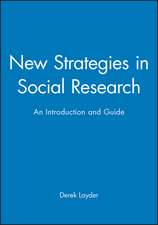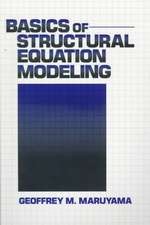Investigative Research: Theory and Practice
Autor Derek Layderen Limba Engleză Paperback – 26 feb 2018
It helps you answer key investigative questions like:
- How are models and maps of social reality crucial to the formulation of research problems and questions?
- What are the main phases, challenges, and theories of investigative research?
- How does investigative research compare with other research approaches, like surveys, case studies, grounded theory, and mixed methods?
- How can you control the quality and validity of your investigative research?
| Toate formatele și edițiile | Preț | Express |
|---|---|---|
| Paperback (1) | 398.21 lei 6-8 săpt. | |
| SAGE Publications – 26 feb 2018 | 398.21 lei 6-8 săpt. | |
| Hardback (1) | 930.28 lei 6-8 săpt. | |
| SAGE Publications – 26 feb 2018 | 930.28 lei 6-8 săpt. |
Preț: 398.21 lei
Nou
Puncte Express: 597
Preț estimativ în valută:
76.20€ • 79.11$ • 63.54£
76.20€ • 79.11$ • 63.54£
Carte tipărită la comandă
Livrare economică 22 martie-05 aprilie
Preluare comenzi: 021 569.72.76
Specificații
ISBN-13: 9781446287538
ISBN-10: 144628753X
Pagini: 200
Dimensiuni: 170 x 242 x 14 mm
Greutate: 0.34 kg
Ediția:1
Editura: SAGE Publications
Colecția Sage Publications Ltd
Locul publicării:London, United Kingdom
ISBN-10: 144628753X
Pagini: 200
Dimensiuni: 170 x 242 x 14 mm
Greutate: 0.34 kg
Ediția:1
Editura: SAGE Publications
Colecția Sage Publications Ltd
Locul publicării:London, United Kingdom
Recenzii
Derek Layder's advocacy of an holistic, context relevant approach to social research which is multifaceted, brings together many traditions of field-based studies in a coherent and imaginative way. His Investigative Research approach offers a framework for real-world explorations that is of value to many social scientists.
Layder convincingly explains that becoming aware of how underlying maps of social reality influence design, analysis and findings is a perquisite for thoroughly reflective research. Moreover, he devises clear strategies for practicing "investigative research” that continuously integrate both data and theory in multidimensional ways. A true advancing of methodological reflection within social science.
Combining adaptive analysis with domain theory, Layder has developed an elaborate approach to investigating today’s social dynamics and complexity. This book provides a precise and reliable compass to doing research that both works and matters.
Layder convincingly explains that becoming aware of how underlying maps of social reality influence design, analysis and findings is a perquisite for thoroughly reflective research. Moreover, he devises clear strategies for practicing "investigative research” that continuously integrate both data and theory in multidimensional ways. A true advancing of methodological reflection within social science.
Combining adaptive analysis with domain theory, Layder has developed an elaborate approach to investigating today’s social dynamics and complexity. This book provides a precise and reliable compass to doing research that both works and matters.
Cuprins
Chapter 1: Research Models, Problems and Questions
The Importance of Models and Maps
Closing Gaps in Knowledge
Influential Models of Social Reality
Should Models be Eliminative or Integrative?
Entangled Domains and Research
Restoring Lost Domains: Investigative Research Problems & Questions
Research Problems, Topics & Questions
Adaptive Method &Theory
Having a Solid Back-Story: Top Soil or Taproots?
Summary of Key Features of Investigative Research
Chapter 2: Dimensions, Quantity & Quality
Some Basic Dimensions of Research
Survey Research as Mono-Method
Theory-Testing Research
Qualitative Approaches
Action (or Transformative) Research
Using IR: Some Practical Suggestions
Chapter 3: Case Studies & Mixed Methods
Case Study Research
Mixed Methods
Using Investigative Research: Some Practical Suggestions
Chapter 4: The Limitations of Grounded Theory
Essential Differences between Investigative Research & Grounded Theory
Different Unfolding Strategies
Data, Concepts & Theoretical Discovery
Conceptual Generation & Theoretical Discovery
The Cul-de-sac of Not-Knowing
Discovery or Innovation?
Ground Theory Mark 2: One Step Forward & Three Back?
Constructionist Grounded Theory: An Even More Limited Version?
Practical Limitations of Constructionist Grounded Theory
Coding, Concept-Formation & Sampling in Investigative Research
Chapter 5: The Arc of Investigative Research
The Research Arc: Phases & Cycles
Models of the Research Process
An Overview of the Investigative Research Model
Cycle-Phase Dynamics
Flexibly Structured Adaptation
Problem Formulation & Orienting Scaffold
A Multi-Strategy, Multi-Method Approach
Phases of Research: An Integrative Framework
Complementary Aspects of Reality
Blending Life-world & System Phenomena
Research Design & Data Types
Data Analysis as Nascent Explanation
Constant Reformulation: A Concluding Comment
Chapter 6: Theory in Investigative Research
Variable Theory & Theory-Testing
Applied General Theory
Empirical Theory: Substantive & Formal
Orienting Concepts (Single or Multiple)
Emergent Concepts
The Deployment of Theory in Overall Research Strategy
Developing Theory in Investigative Research: An Overview
Modifying and Creating Theory and Concepts
Generic Research Outcomes
Cumulative Knowledge & Theory-Development
An Appropriate Model of Social Reality
Chapter 7: Networks & Domains: A Research Guide
Activities and Settings: A Central Pairing
Social Behaviour & Social Reality
Distinguishing Settings from Locations/Locales
Primary & Secondary Settings: Transition Zones
Networks & Social Domains
Organized Settings & Networks
Informal Settings & Networks
Research Questions for Networks and Domains
Matching Concepts with Empirical Indicators
Selecting Data Threads within Domains
Identifying Settings from Data
Variations in Organized Settings
Work Organizations as Social settings
Smaller ‘Organizations’ & Informal Settings
Selective Focusing
Examples of Selective Focusing
Causal Influence & Causal Explanation
One-Dimensional Causality: The Case of Gender & Intimacy
Intimacy & Situated Activity
Social Settings, Gender & Intimacy
Researching Causality
Research, Causality & Theory Building
Chapter 8: Continuous Quality Control
Quality Control: The Central Importance of Validity
The Research Process: A Two-Tiered Model
The Research Matrix (or Grid)
The Preparatory Phase
The Data Gathering Phase
The Analytic /Explanatory Phase
Conclusion
The Importance of Models and Maps
Closing Gaps in Knowledge
Influential Models of Social Reality
Should Models be Eliminative or Integrative?
Entangled Domains and Research
Restoring Lost Domains: Investigative Research Problems & Questions
Research Problems, Topics & Questions
Adaptive Method &Theory
Having a Solid Back-Story: Top Soil or Taproots?
Summary of Key Features of Investigative Research
Chapter 2: Dimensions, Quantity & Quality
Some Basic Dimensions of Research
Survey Research as Mono-Method
Theory-Testing Research
Qualitative Approaches
Action (or Transformative) Research
Using IR: Some Practical Suggestions
Chapter 3: Case Studies & Mixed Methods
Case Study Research
Mixed Methods
Using Investigative Research: Some Practical Suggestions
Chapter 4: The Limitations of Grounded Theory
Essential Differences between Investigative Research & Grounded Theory
Different Unfolding Strategies
Data, Concepts & Theoretical Discovery
Conceptual Generation & Theoretical Discovery
The Cul-de-sac of Not-Knowing
Discovery or Innovation?
Ground Theory Mark 2: One Step Forward & Three Back?
Constructionist Grounded Theory: An Even More Limited Version?
Practical Limitations of Constructionist Grounded Theory
Coding, Concept-Formation & Sampling in Investigative Research
Chapter 5: The Arc of Investigative Research
The Research Arc: Phases & Cycles
Models of the Research Process
An Overview of the Investigative Research Model
Cycle-Phase Dynamics
Flexibly Structured Adaptation
Problem Formulation & Orienting Scaffold
A Multi-Strategy, Multi-Method Approach
Phases of Research: An Integrative Framework
Complementary Aspects of Reality
Blending Life-world & System Phenomena
Research Design & Data Types
Data Analysis as Nascent Explanation
Constant Reformulation: A Concluding Comment
Chapter 6: Theory in Investigative Research
Variable Theory & Theory-Testing
Applied General Theory
Empirical Theory: Substantive & Formal
Orienting Concepts (Single or Multiple)
Emergent Concepts
The Deployment of Theory in Overall Research Strategy
Developing Theory in Investigative Research: An Overview
Modifying and Creating Theory and Concepts
Generic Research Outcomes
Cumulative Knowledge & Theory-Development
An Appropriate Model of Social Reality
Chapter 7: Networks & Domains: A Research Guide
Activities and Settings: A Central Pairing
Social Behaviour & Social Reality
Distinguishing Settings from Locations/Locales
Primary & Secondary Settings: Transition Zones
Networks & Social Domains
Organized Settings & Networks
Informal Settings & Networks
Research Questions for Networks and Domains
Matching Concepts with Empirical Indicators
Selecting Data Threads within Domains
Identifying Settings from Data
Variations in Organized Settings
Work Organizations as Social settings
Smaller ‘Organizations’ & Informal Settings
Selective Focusing
Examples of Selective Focusing
Causal Influence & Causal Explanation
One-Dimensional Causality: The Case of Gender & Intimacy
Intimacy & Situated Activity
Social Settings, Gender & Intimacy
Researching Causality
Research, Causality & Theory Building
Chapter 8: Continuous Quality Control
Quality Control: The Central Importance of Validity
The Research Process: A Two-Tiered Model
The Research Matrix (or Grid)
The Preparatory Phase
The Data Gathering Phase
The Analytic /Explanatory Phase
Conclusion
Notă biografică
Descriere
With its unique modelling and mapping of social processes, investigative research offers an alternative approach to social research. This book guides you through the theoretical grounding and rules you need to effectively combine the evidence-based explanations of social behaviour and distinctive strategies of data collection associated with investigative research.




























